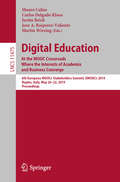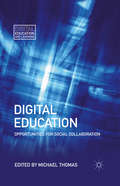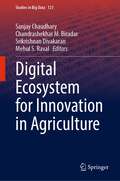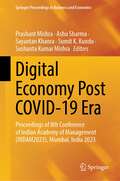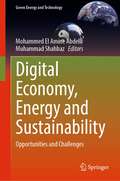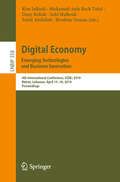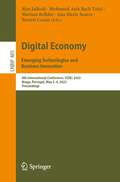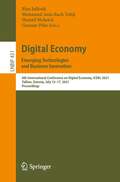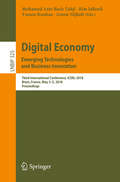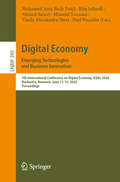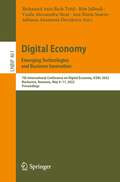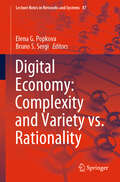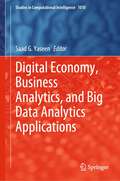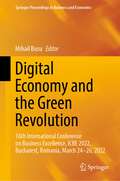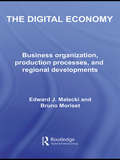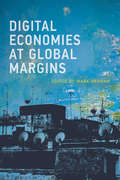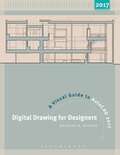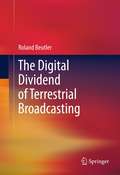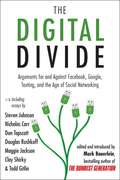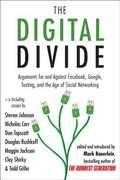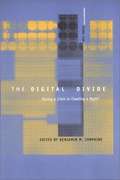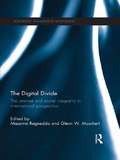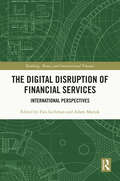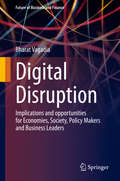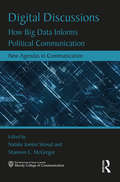- Table View
- List View
Digital Education: 6th European MOOCs Stakeholders Summit, EMOOCs 2019, Naples, Italy, May 20–22, 2019, Proceedings (Lecture Notes in Computer Science #11475)
by Mauro Calise Carlos Delgado Kloos Justin Reich Jose A. Ruiperez-Valiente Martin WirsingThis book constitutes the proceedings of the 6th European Conference on Massive Open Online Courses, EMOOCs 2019, held in Naples, Italy, in May 2019. The 15 full and 6 short papers presented in this volume were carefully reviewed and selected from 42 submissions. Massive Open Online Courses (MOOCs) have marked a milestone in the use of technology for education. The reach, potential, and possibilities of EMOOCs are immense. But they are not only restricted to global outreach: the same technology can be used to improve teaching on campus and training inside companies and institutions. The chapter 'Goal Setting and Striving in MOOCs. A Peek inside the Black Box of Learner Behaviour' is open access under a CC BY 4.0 license at link.springer.com.
Digital Education: Opportunities for Social Collaboration
by Michael ThomasA collection of content-based chapters and case studies examining the pedagogical potential and realities of digital literacies in education. The book aims to examine a number of foundational aspects of Web 2. 0 technologies and social media applications and to understand the implications for teaching, learning, and professional development.
Digital Ecosystem for Innovation in Agriculture (Studies in Big Data #121)
by Sanjay Chaudhary Chandrashekhar M. Biradar Srikrishnan Divakaran Mehul S. RavalThis book presents the latest findings in the areas of digital ecosystem for innovation in agriculture. The book is organized into two sections with thirteen chapters dealing with specialized areas. It provides the reader with an overview of the frameworks and technologies involved in the digitalization of agriculture, as well as the data processing methods, decision-making processes, and innovative services/applications for enabling digital transformations in agriculture. The chapters are written by experts sharing their experiences in lucid language through case studies, suitable illustrations, and tables. The contents have been designed to fulfill the needs of geospatial, data science, agricultural, and environmental sciences of universities, agricultural universities, technological universities, research institutes, and academic colleges worldwide. It helps the planners, policymakers, and extension scientists plan and sustainably manage agriculture and natural resources.
Digital Economy Post COVID-19 Era: Proceedings of 8th Conference of Indian Academy of Management (INDAM2023), Mumbai, India 2023 (Springer Proceedings in Business and Economics)
by Prashant Mishra Ashu Sharma Sayantan Khanra Sumit K. Kundu Sushanta Kumar MishraThis book presents the future directions of the digital economy post Covid-19 era. The chapters of this book cover contemporary topics on digital economy and digital initiatives undertaken by various organizations. Overall, the book shares insights on how organizations can adapt and transform their processes, structure, and strategies to remain relevant and competitive in the new business and economic environment. These insights also emerge from multidisciplinary discussions in various management domains, such as, consumer behaviour and marketing, economics, finance and accounting, entrepreneurship and small business management, environmental, social and governance compliance, future of work, human resource management, leadership, inclusive workforce, information systems and decision sciences, international business and strategy, and operations and supply chain management.
Digital Economy, Energy and Sustainability: Opportunities and Challenges (Green Energy and Technology)
by Mohammed El Amine Abdelli Muhammad ShahbazThis book looks at how digital economy can help energy businesses to meet their sustainability goals. It will further generates a new debate among policymakers about encouraging green technologies to reduce global carbon emissions.Our modern society requires a long-term, sustainable, and secure energy supply that not only generates and preserves renewable energy. It is also creating universal intelligent machines for power systems, and vital infrastructure is considered in terms of digital economy requirements. The idea of sharing information is an essential principle of sustainable thinking. In such instances, open internet and data access are required to enable any human being to acquire knowledge. Furthermore, the energy industry is changing worldwide, necessitating the consideration of potential implications and modifications. Thus, its most distinguishing feature is moving from a centrally organized system to one with many market players. Consequently, information and communication technologies and human growth have significant main and interactive effects on environmental sustainability. Simultaneously, energy industry is a major player in resolving the digital economy’s development issues.
Digital Economy. Emerging Technologies and Business Innovation: 4th International Conference, ICDEc 2019, Beirut, Lebanon, April 15–18, 2019, Proceedings (Lecture Notes in Business Information Processing #358)
by Rim Jallouli Mohamed Anis Bach Tobji Deny Bélisle Sehl Mellouli Farid Abdallah Ibrahim OsmanThis book constitutes the refereed proceedings of the 4th International Conference on Digital Economy, ICDEc 2019, held in Beirut, Lebanon, in April 2019. The conference was founded in 2016 to discuss innovative research and projects related to the support role of Information System Technologies in the digital transformation process, business innovation and e-commerce. The 31 papers presented in this volume were carefully reviewed and selected from 89 submissions. The theme of ICDEc 2019 was “Digital Economy: Emerging Technologies and Business Innovation”. The papers were organized in topical sections named: digital transformation; e-finance; social media communication; intelligent systems; e-commerce and business analytics; e-learning and cloud education; e-commerce and digital economy; data science; digital marketing; and digital business model.
Digital Economy. Emerging Technologies and Business Innovation: 8th International Conference, ICDEc 2023, Braga, Portugal, May 2–4, 2023, Proceedings (Lecture Notes in Business Information Processing #485)
by Rim Jallouli Mohamed Anis Bach Tobji Meriam Belkhir Ana Maria Soares Beatriz CasaisThis book constitutes the proceedings of the 8th International Conference on Digital Economy, ICDEc 2023, which took place in Braga, Portugal, in May 2023.The 26 full papers included in this volume were carefully reviewed and selected from 72 submissions. They were organized in topical sections as follows: Digital transformation; e-learning and digital competencies; digital marketing and artificial intelligence; e-finance and digital assets; digital marketing and data analytics; digital economy; online session.
Digital Economy. Emerging Technologies and Business Innovation: 6th International Conference on Digital Economy, ICDEc 2021, Tallinn, Estonia, July 15–17, 2021, Proceedings (Lecture Notes in Business Information Processing #431)
by Rim Jallouli Mohamed Anis Bach Tobji Hamid Mcheick Gunnar PihoThis book constitutes the proceedings of the 6th International Conference on Digital Economy, ICDEc 2021. The conference was held during July 15-17, 2021. It was initially planned to take place in Tallin, Estonia, but changed to a virtual event due to the COVID-19 pandemic.The 18 papers presented in this volume were carefully reviewed and selected from 51 submissions. They were organized in topical sections as follows: Digital strategies; virtual communities; digital assets and blockchain technology; artificial intelligence and data science; online education; digital transformation; and augmented reality and IOT.
Digital Economy. Emerging Technologies and Business Innovation: Third International Conference, ICDEc 2018, Brest, France, May 3-5, 2018, Proceedings (Lecture Notes in Business Information Processing #325)
by Mohamed Anis Bach Tobji Rim Jallouli Yamen Koubaa Anton NijholtThis book constitutes the refereed proceedings of the Third International Conference on Digital Economy, ICDEc 2018, held in Brest, France in May 2018. The conference was founded in 2016 to discuss innovative research and projects related to the support role of Information System Technologies in the digital transformation process, business innovation and e-commerce. The 15 papers presented in this volume were carefully reviewed and selected from 41 submissions. The theme of ICDEc 2018 was “Digital Economy: Emerging Technologies and Business Innovation”. The papers were organized in topical sections named: digital marketing; e-banking and competitive intelligence; information system technologies; and e-learning, e-government and e-health.
Digital Economy. Emerging Technologies and Business Innovation: 5th International Conference on Digital Economy, ICDEc 2020, Bucharest, Romania, June 11–13, 2020, Proceedings (Lecture Notes in Business Information Processing #395)
by Mohamed Anis Bach Tobji Rim Jallouli Ahmed Samet Mourad Touzani Vasile Alecsandru Strat Paul PocatiluThis book constitutes the refereed proceedings of the 5th International Conference, ICDEc 2020, held in Bucharest, Romania, in June 2020. Due to the COVID-19 pandemic the conference took place virtually. The 13 full papers presented in this volume together with 3 abstracts of keynotes and 1 introductory paper by the steering committee were carefully reviewed and selected from a total of 41 submissions. The core theme of this year’s conference was “Emerging Technologies & Business Innovation”. The papers were organized in four topical sections named: digital transformation, data analytics, digital marketing, and digital business models.
Digital Economy. Emerging Technologies and Business Innovation: 7th International Conference on Digital Economy, ICDEc 2022, Bucharest, Romania, May 9–11, 2022, Proceedings (Lecture Notes in Business Information Processing #461)
by Mohamed Anis Bach Tobji Rim Jallouli Vasile Alecsandru Strat Ana Maria Soares Adriana Anamaria DavidescuThis book constitutes the proceedings of the 7th International Conference on Digital Economy, ICDEc 2022, which took place in Bucharest, Romania, in May 2022. The 15 full papers included in this volume were carefully reviewed and selected from 44 submissions. They were organized in topical sections as follows: Digitalization and COVID 19; digital business models for education and healthcare; IT user behavior and satisfaction; digital marketing; and digital transformation.
Digital Economy: Complexity and Variety vs. Rationality (Lecture Notes in Networks and Systems #87)
by Elena G. Popkova Bruno S. SergiThis proceedings book features selected papers from the 9th National Scientific and Practical Conference “Digital Economy: Complexity and Variety Vs. Rationality,” which took place on April 17–18, 2019, in Vladimir (Russian Federation). It presents the latest research in the field of the digital economy, discussing its role in the creation of advantages for the state, entrepreneurship, and society, as well as the emergence of new economic risks. The chapters address the following topics: the importance of economy’s digital modernization, tools for the formation of the digital economy in Russia, specific features and perspectives of digital modernization of the regional economy, an overview of the social consequences of transition to the digital economy, financial components of the digital economy, legal challenges regarding the digital reality for society and state, and the main challenges and threats to the profession of jurisprudence in the context of the digitization of the economy. Intended for representatives of the academic community and researchers interested in the formation of the digital economy and digital society as well as undergraduates, postgraduates, and masters of economic specialties, the book is also a valuable resource for companies that use or wishing to implement digital technologies into their economic practices; and public and government employees involved with monitoring, control, and regulation of the digital economy.
Digital Economy, Business Analytics, and Big Data Analytics Applications (Studies in Computational Intelligence #1010)
by Saad G. YaseenThis book is about turning data into smart decisions, knowledge into wisdom and business into business intelligence and insight. It explores diverse paradigms, methodologies, models, tools and techniques of the emerging knowledge domain of digitalized business analytics applications.The book covers almost every crucial aspect of applied artificial intelligence in business, smart mobile and digital services in business administration, marketing, accounting, logistics, finance and IT management.This book aids researchers, practitioners and decisions makers to gain enough knowledge and insight on how to effectively leverage data into competitive intelligence.
Digital Economy and the Green Revolution: 16th International Conference on Business Excellence, ICBE 2022, Bucharest, Romania, March 24-26, 2022 (Springer Proceedings in Business and Economics)
by Mihail BusuThis book presents a selection of the best papers from the 16th International Conference on Business Excellence, “New Challenges of the Century. Digital Economy and the Green Revolution” (ICBE 2022), held in Bucharest, Romania, in March 2022. Showcasing research findings and perspectives on the new challenges posed by the digital economy and research systems, the book offers valuable insights into the present context of global crisis, together with solutions for the real-world challenges we face today.
The Digital Economy: Business Organization, Production Processes and Regional Developments
by Edward J. Malecki Bruno MorisetInformation technologies (IT) shape economic space, but we have no clear map of the cyber economy since the "digital revolution" began in the early 1970s. The Digital Economy offers an up-to-date, critical synthesis that links the various aspects of the digital or cyber economy from the perspective of real firms. A geographic approach emphasizes how IT has made businesses less dependent on locational constraints, and the tangible effects on places and regions are placed at the core of the analysis. Case studies of companies, including Amazon, Dell, Li & Fung, and Volvo, demonstrate that the geography of digitally-driven production is the outcome of both dispersion and agglomeration dynamics. Global corporations are shown to have footprints that ignore – to some degree – distance and time, yet creative and coordinating activities remain anchored in urban innovative ecosystems such as Silicon Valley and Bangalore. These trends have been made possible by the development of a worldwide and integrated telecommunications network, whose unequal presence dictates the capabilities of places and communities to be connected to the global economy. However, the threat of the digital divide must not be overstated. In cities, rural areas, and emerging countries, local development is wrapped up in human capital, rather than technology. This engaging and accessible text describes and explains the patterns and dynamics of today’s digital economic space. The effects on places and regions and the people in them are at the core of the authors’ analysis, illustrated by many real examples. This book will be useful to anyone studying business and management, geography and information and communication studies.
Digital Economies at Global Margins (International Development Research Centre)
by Mark GrahamInvestigations of what increasing digital connectivity and the digitalization of the economy mean for people and places at the world's economic margins.Within the last decade, more than one billion people became new Internet users. Once, digital connectivity was confined to economically prosperous parts of the world; now Internet users make up a majority of the world's population. In this book, contributors from a range of disciplines and locations investigate the impact of increased digital connectivity on people and places at the world's economic margins. Does the advent of a digitalized economy mean that those in economic peripheries can transcend spatial, organizational, social, and political constraints—or do digital tools and techniques tend to reinforce existing inequalities?The contributors present a diverse set of case studies, reporting on digitalization in countries ranging from Chile to Kenya to the Philippines, and develop a broad range of theoretical positions. They consider, among other things, data-driven disintermediation, women's economic empowerment and gendered power relations, digital humanitarianism and philanthropic capitalism, the spread of innovation hubs, and two cases of the reversal of core and periphery in digital innovation.ContributorsNiels Beerepoot, Ryan Burns, Jenna Burrell, Julie Yujie Chen, Peter Dannenberg, Uwe Deichmann, Jonathan Donner, Christopher Foster, Mark Graham, Nicolas Friederici, Hernan Galperin, Catrihel Greppi, Anita Gurumurthy, Isis Hjorth, Lilly Irani, Molly Jackman, Calestous Juma, Dorothea Kleine, Madlen Krone, Vili Lehdonvirta, Chris Locke, Silvia Masiero, Hannah McCarrick,Deepak K. Mishra, Bitange Ndemo, Jorien Oprins, Elisa Oreglia, Stefan Ouma, Robert Pepper, Jack Linchuan Qiu, Julian Stenmanns, Tim Unwin, Julia Verne, Timothy Waema
Digital Drawing For Designers: A Visual Guide To Autocad® 2017
by Douglas R. SeidlerAutoCAD continues to dominate the two-dimensional drafting marketplace for architects and interior designers. Digital Drawing for Designers: A Visual Guide to AutoCAD 2017 is designed to help this community by visually teaching for step-by-step understanding. Beginning with the building blocks of drawing (lines, circles, and arcs), the book progresses through architectural graphic standards, enabling students to create presentation and construction drawings that effectively communicate their design ideas. Advanced features such as annotative dimensions, annotative blocks, express tools, and linking drawings (XREFs) are also covered. Instructions are illustrated using language and concepts from manual drafting, facilitating a smooth transition to the digital environment for all designers. New learners will appreciate the step-by-step lessons and visual illustrations, while experienced design professionals can easily access material to refresh their knowledge. Clear, concise, and above all visual, this AutoCAD guide speaks directly to the needs of architects and interior designers.
The Digital Dividend of Terrestrial Broadcasting
by Roland BeutlerThe "digital revolution" of the last two decades has pervaded innumerable aspects of our daily lives and changed our planet irreversibly. The shift from analog to digital broadcasting has facilitated a seemingly infinite variety of new applications--audience interactivity being but one example. The greater efficiency and compression of digital media have endowed broadcasters with a "digital dividend" of spare transmission capacity over and above the requirements of terrestrial broadcasting. The question is, who will use it, and how? Comparing the European experience with that of broadcasters elsewhere in the world, the author sketches the current status of international frequency management, quantifies the value of the "dividend" itself, analyzes the details of the analog-to-digital switchovers already completed, and posits what the future holds for the sector. As we grapple with new devices, inconceivable a mere generation ago, that allow us to access digital media instantly, anywhere and at any time of day, this book is a potent reminder that what we have witnessed so far may be just the first wavering steps along a road whose destination we can only guess at.
The Digital Divide
by Mark BauerleinThis definitive work on the perils and promise of the social-media revolution collects writings by today's best thinkers and cultural commentators, with an all-new introduction by Bauerlein. Twitter, Facebook, e-publishing, blogs, distance-learning and other social media raise some of the most divisive cultural questions of our time. Some see the technological breakthroughs we live with as hopeful and democratic new steps in education, information gathering, and human progress. But others are deeply concerned by the eroding of civility online, declining reading habits, withering attention spans, and the treacherous effects of 24/7 peer pressure on our young. With The Dumbest Generation, Mark Bauerlein emerged as the foremost voice against the development of an overwhelming digital social culture. But The Digital Divide doesn't take sides. Framing the discussion so that leading voices from across the spectrum, supporters and detractors alike, have the opportunity to weigh in on the profound issues raised by the new media-from questions of reading skills and attention span, to cyber-bullying and the digital playground- Bauerlein's new book takes the debate to a higher ground. The book includes essays by Steven Johnson, Nicholas Carr, Don Tapscott, Douglas Rushkoff, Maggie Jackson, Clay Shirky, Todd Gitlin, and many more. Though these pieces have been previously published, the organization of The Digital Dividegives them freshness and new relevancy, making them part of a single document readers can use to truly get a handle on online privacy, the perils of a plugged-in childhood, and other technology-related hot topics. Rather than dividing the book into "pro" and "con" sections, the essays are arranged by subject-"The Brain, the Senses," "Learning in and out of the Classroom," "Social and Personal Life," "The Millennials," "The Fate of Culture," and "The Human (and Political) Impact." Bauerlein incorporates a short headnote and a capsule bio about each contributor, as well as relevant contextual information about the source of the selection. Bauerlein also provides a new introduction that traces the development of the debate, from the initial Digital Age zeal, to a wave of skepticism, and to a third stage of reflection that wavers between criticism and endorsement. Enthusiasms for the Digital Age has cooled with the passage of time and the piling up of real-life examples that prove the risks of an online-focused culture. However, there is still much debate, comprising thousands of commentaries and hundreds of books, about how these technologies are rewriting our futures. Now, with this timely and definitive volume, readers can finally cut through the clamor, read the the very best writings from each side of The Digital Divide, and make more informed decisions about the presence and place of technology in their lives.
The Digital Divide
by Mark BauerleinThis definitive work on the perils and promise of the social- media revolution collects writings by today's best thinkers and cultural commentators, with an all-new introduction by Bauerlein. Twitter, Facebook, e-publishing, blogs, distance-learning and other social media raise some of the most divisive cultural questions of our time. Some see the technological breakthroughs we live with as hopeful and democratic new steps in education, information gathering, and human progress. But others are deeply concerned by the eroding of civility online, declining reading habits, withering attention spans, and the treacherous effects of 24/7 peer pressure on our young. With The Dumbest Generation, Mark Bauerlein emerged as the foremost voice against the development of an overwhelming digital social culture. But The Digital Divide doesn't take sides. Framing the discussion so that leading voices from across the spectrum, supporters and detractors alike, have the opportunity to weigh in on the profound issues raised by the new media-from questions of reading skills and attention span, to cyber-bullying and the digital playground- Bauerlein's new book takes the debate to a higher ground. The book includes essays by Steven Johnson, Nicholas Carr, Don Tapscott, Douglas Rushkoff, Maggie Jackson, Clay Shirky, Todd Gitlin, and many more. Though these pieces have been previously published, the organization of The Digital Divide gives them freshness and new relevancy, making them part of a single document readers can use to truly get a handle on online privacy, the perils of a plugged-in childhood, and other technology-related hot topics. Rather than dividing the book into "pro" and "con" sections, the essays are arranged by subject-"The Brain, the Senses," "Learning in and out of the Classroom," "Social and Personal Life," "The Millennials," "The Fate of Culture," and "The Human (and Political) Impact. " Bauerlein incorporates a short headnote and a capsule bio about each contributor, as well as relevant contextual information about the source of the selection. Bauerlein also provides a new introduction that traces the development of the debate, from the initial Digital Age zeal, to a wave of skepticism, and to a third stage of reflection that wavers between criticism and endorsement. Enthusiasms for the Digital Age has cooled with the passage of time and the piling up of real-life examples that prove the risks of an online-focused culture. However, there is still much debate, comprising thousands of commentaries and hundreds of books, about how these technologies are rewriting our futures. Now, with this timely and definitive volume, readers can finally cut through the clamor, read the the very best writings from each side of The Digital Divide, and make more informed decisions about the presence and place of technology in their lives. .
The Digital Divide: Facing a Crisis or Creating a Myth?
by Benjamin M. CompaineThe Digital Divide refers to the perceived gap between those who have access to the latest information technologies and those who do not. If we are indeed in an Information Age, then not having access to this information is an economic and social handicap. Some people consider the Digital Divide to be a national crisis, while others consider it an over-hyped nonissue. This book presents data supporting the existence of such a divide in the 1990s along racial, economic, ethnic, and education lines. But it also presents evidence that by 2000 the gaps are rapidly closing without substantive public policy initiatives and spending. Together, the contributions serve as a sourcebook on this controversial issue.
The Digital Divide: The Internet and Social Inequality in International Perspective (Routledge Advances in Sociology)
by Massimo Ragnedda Glenn W. MuschertThis book provides an in-depth comparative analysis of inequality and the stratification of the digital sphere. Grounded in classical sociological theories of inequality, as well as empirical evidence, this book defines ‘the digital divide’ as the unequal access and utility of internet communications technologies and explores how it has the potential to replicate existing social inequalities, as well as create new forms of stratification. The Digital Divide examines how various demographic and socio-economic factors including income, education, age and gender, as well as infrastructure, products and services affect how the internet is used and accessed. Comprised of six parts, the first section examines theories of the digital divide, and then looks in turn at: Highly developed nations and regions (including the USA, the EU and Japan); Emerging large powers (Brazil, China, India, Russia); Eastern European countries (Estonia, Romania, Serbia); Arab and Middle Eastern nations (Egypt, Iran, Israel); Under-studied areas (East and Central Asia, Latin America, and sub-Saharan Africa). Providing an interwoven analysis of the international inequalities in internet usage and access, this important work offers a comprehensive approach to studying the digital divide around the globe. It is an important resource for academic and students in sociology, social policy, communication studies, media studies and all those interested in the questions and issues around social inequality.
The Digital Disruption of Financial Services: International Perspectives (Banking, Money and International Finance)
by Ewa LechmanThis book contributes to the present state of knowledge, offering the reader broad evidence on how new digital technologies impact financial systems. It focuses on both macro- and micro-perspectives of ICT influence on financial markets. The book demonstrates how ICT can impact trading systems or information systems, which are crucial for financial systems to work effectively. It also shows how individuals can benefit from the adoption of digital technologies for everyday financial (e.g., banking) systems usage. The book provides empirical evidence of how digital technologies revolutionize the banking sector and stock exchange trading system and explores the associations between technology and various aspects of firms’ functioning. Furthermore, it raises elements of financial inclusion, ICT-based microfinance service and finance-related gender issues. The principal audience of the book will be scholars and academic professionals from a wide variety of disciplines, particularly in the fields of finance and economics. It will be especially useful for those who are addressing the issues of new technologies and the financial markets, FinTech, financial innovations, stock markets, and the role of technological progress in a broadly defined socio-economic system. It will be a valuable source of knowledge for graduate and postgraduate students in economic and social development, information and technology, worldwide studies, social policy or comparative economics.
Digital Disruption: Implications and opportunities for Economies, Society, Policy Makers and Business Leaders (Future of Business and Finance)
by Bharat VagadiaThis book goes beyond the hype, delving into real world technologies and applications that are driving our future and examines the possible impact these changes will have on industries, economies and society at large. It details the actions governments and regulators must take in order to ensure these changes bring about positive benefits to the public without stifling innovation that may well be the future source of value creation. It examines how organisations in a world of digital ecosystems, where industry boundaries are blurring, must undertake radical digital transformation to survive and thrive in this new digital world. The reader is taken through a framework that critically examines (i) Digital Connectivity including 5G and IoT; (ii) Data Capture and Distribution which includes smart connected verticals; (iii) Data Integrity, Control and Tokenisation that includes cyber security, digital signatures, blockchain, smart contracts, digital assets and cryptocurrencies; (iv) Data Processing and Artificial Intelligence; and (v) Disruptive Applications which include platforms, virtual and augmented reality, drones, autonomous vehicles, digital twins and digital assistants.
Digital Discussions: How Big Data Informs Political Communication (New Agendas in Communication Series)
by Natalie Jomini Stroud Shannon McGregorBig data raise major research possibilities for political communication scholars who are interested in how citizens, elites, and journalists interact. With the availability of social media data, academics can observe, on a large scale, how people talk about politics. The opportunity to study political discussions is also available to media organizations and political elites—examining how they make use of big data represents another fruitful scholarly trajectory. The scholars involved in Digital Discussions represent forward thinkers who aim to inform the study of political communication by analyzing the behavior of and messages left by citizens, elites, and journalists in digital spaces. By using a variety of methodological approaches and bringing together diverse theoretical perspectives, this group sheds light on how big data can inform political communication research. It is critical reading for those studying and working in communication studies with a focus on big data.
